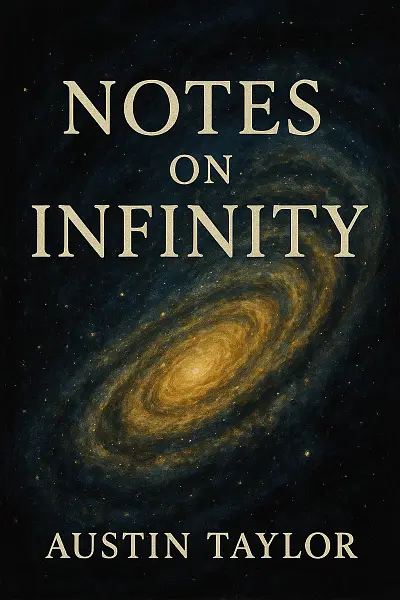
Notes on Infinity
by: Austin Taylor
Zoe, hungry for acclaim and a fresh start at Harvard, meets Jack—a whip-smart classmate whose ambition matches her own. Together, late-night debates morph into a secret collaboration with a single, electrifying goal: curing ageing itself. An astonishing breakthrough rocks their world, launching them from lab partners to biotech wunderkinds.
Fueled by hope, they chase recognition and fortune, dropping out to launch a startup that suddenly has the nation watching. Just as their dreams teeter on the verge of reality, a shattering accusation threatens everything: their company, their reputations, and their fragile trust in each other.
With crisp, energetic prose, Notes on Infinity buzzes with scientific thrill and the ache of ambition. Every page pulses with the question—will Zoe and Jack’s bond survive the fallout, or will the price of eternity be too steep?
"“To glimpse infinity is to remember that every ending is just the world beginning again in a different light.”"
Let's Break This Down
The Author's Voice
Atmosphere
Expect to be immersed in a dreamlike landscape: The book’s mood veers between cosmic wonder and intimate vulnerability, often blurring the line between reality and philosophical musing. There’s a gentle haze to the settings and internal spaces, making everything feel both immediate and just out of reach, like chasing stardust at twilight. Every page feels awash in quiet awe, humming with existential curiosity.
Prose Style
Lyrical yet uncluttered: Austin Taylor’s writing leans toward poetic imagery and evocative metaphors, but never loses sight of clarity. Sentences ripple with emotional resonance—occasionally fragmentary, often rhythmic—creating a musicality that’s easy to sink into. There’s a balance of elegant phrasing and approachable language, keeping the style accessible even when touching on heady themes.
Pacing
Introspective and measured: This isn’t a story in a race—it moves with the thoughtful tempo of a midnight walk under endless stars. Moments of quiet reflection outweigh bursts of action. Some scenes linger longer than expected, inviting readers to sit with ideas and emotions. The narrative rhythm encourages a slower reading pace, ideal for savoring, though it may feel meandering to those craving constant momentum.
Character Development
Internal journeys take center stage: The cast is small and deeply introspective, with feelings and philosophical wrestling at the heart of personal arcs. Don’t expect sweeping transformations—growth comes in subtler shifts of perspective. Dialogue is intimate and searching, less about plot and more about exploring questions, doubts, and quiet revelations.
Themes
Wide-open existential exploration: Infinity, purpose, and the beauty (and ache) of the unknown are everywhere. The writing encourages readers to gaze both outward at the cosmos and inward at the soul, trusting them to draw their own conclusions. Taylor’s approach is gentle and invitational, never heavy-handed, leaving plenty of space for personal interpretation.
Overall Literary Rhythm
Soft, searching, and faintly mystical: "Notes on Infinity" is best read as a meditative experience. Its voice is as much about atmosphere and inner movement as it is about events—perfect for readers who value mood, meaning, and mindful contemplation over tidy resolution or breakneck action. It’s the kind of book you’ll want to revisit with a highlighter, lingering on favorite passages and letting its questions echo after the last page.
Key Moments
-
Quantum theories turned into deeply personal confessions—Taylor blends science with raw autobiography
-
The Ferris wheel scene where Anna glimpses her own past looping infinitely—goosebumps!
-
Metaphors stack like fractals, pulling you deeper into the spiral of memory and desire
-
Lucas’s late-night monologue about entropy—one of those “pause and stare out the window” moments
-
Time-bending structure: flashbacks weave seamlessly with frenetic present-day narration
-
Recurring motif of shattered clocks—each one a reminder that healing isn’t linear
-
Ends not with answers but with a quietly stunning sense of possibility
Plot Summary
Notes on Infinity by Austin Taylor takes readers on a mind-bending journey with Mara, a disillusioned math prodigy who stumbles upon a mysterious journal mapping secret “points of infinity” hidden in the ordinary world. Driven by grief over her brother's disappearance, Mara follows cryptic clues across continents with Leo, an enigmatic artist on a similar quest. The stakes rise as the journal hints that solving the infinite pattern might rewrite the laws of reality—and possibly bring her brother back. The climax hits when Mara sacrifices her own memories to unlock the final convergence, discovering that her brother willingly crossed into another dimensional pattern and only remembrance, not rescue, is possible. In the resolution, Mara returns home changed: accepting the loss, she fills the last pages of the journal with her reflections, choosing presence over pursuit, and leaving the door open for new seekers.
Character Analysis
Mara is the soulful core of the story, shifting from emotionally withdrawn and fiercely logical to open-minded, vulnerable, and ultimately at peace with ambiguity. Her simmering grief is the engine of her quest, pushing her to test the limits of reason and belief. Leo, acting as both guide and foil, challenges Mara’s certainty, offering flashes of humor and artful philosophy that coax out her risk-taking side. The absent brother Jude operates like a ghostly anchor—his choices and absence shaping Mara’s growth more deeply than any direct confrontation ever could.
Major Themes
At heart, the novel unpacks the search for meaning: Mara’s quest is both literal and metaphysical, showing how humans crave patterns in the chaos of loss. Infinity is everywhere—both as a mathematical concept and metaphor for grief, love, and possibility. Taylor explores how obsession can consume, but also how letting go is a form of courage (seen when Mara chooses not to pursue her brother beyond the veil). The book also questions the boundaries between science and faith, showing their shared longing for answers in an uncertain universe.
Literary Techniques & Style
Taylor’s writing is lush, modern, and tinged with lyricism—a voice that blends clear-eyed description with poetic flights, especially when grappling with mathematical imagery. The use of the journal as a narrative device allows for fragmentation—flashbacks, sketches, and dream-like sequences that mirror Mara’s fractured psyche. There’s frequent symbolism—mirrors, Möbius strips, and recurring patterns in nature all point to deeper thematic currents. The dialogue sparkles with dry wit, and Taylor isn’t afraid to experiment, using nonlinear chronology to mirror the book’s preoccupation with bending time and meaning.
Historical/Cultural Context
Notes on Infinity unfolds in a 21st-century setting—globally connected, yet emotionally fragmented. The novel reflects contemporary anxieties about technology, information overload, and personal isolation, with characters traveling from bustling cities to remote research outposts. There are nods to current debates in quantum theory and popular science culture, along with subtle critiques of academic competitiveness and the pressure on young talent.
Critical Significance & Impact
Taylor’s novel stands out for skillfully blending coming-of-age with speculative fiction, inviting both emotional investment and intellectual curiosity. Critics have lauded it for making complex ideas accessible without diluting their mystery. While some readers find the ending ambiguous, many celebrate its refusal to tie up every thread, arguing that this risk makes the novel linger in the mind longer. It’s already sparked countless book club debates and is popping up on syllabi for its fresh take on grief, discovery, and the infinite.

When memory fractures reality, humanity’s fate bends toward the infinite.
What Readers Are Saying
Right for You If
Alright, let’s talk about who’s actually going to vibe with Notes on Infinity by Austin Taylor, and who might want to give it a pass:
If you geek out over...
- Philosophical fiction that isn’t afraid to get a little weird or deep
- Books that blend real-life issues with a slightly surreal, dreamy edge
- Self-discovery journeys where the “plot” is just as internal as it is external
- Stories told in lyrical, almost poetic writing (think John Green but a little more grown-up and existential)
- Digging into those big questions—meaning, mortality, the universe—without necessarily getting any neat answers
- Anything that feels like a love letter to thinkers, creatives, or anyone who has midnight conversations about the stars
...this book is basically made for you. Seriously, you’ll feel seen.
But, fair warning, you might want to skip it if:
- You crave action-heavy, fast-paced stories or tightly plotted thrillers
- You get impatient with books that wander, linger, or lean into ambiguity
- You prefer concrete resolutions and don’t really enjoy open endings or lots of “what does it all mean?” moments
- Experimental structure or non-linear timelines just aren’t your jam (this one doesn’t always color inside the narrative lines)
Bottom line?
If you love to get lost in lyrical prose and don’t mind coming out of a book with more questions than answers, give this one a shot. But if you need your books to move fast and tie up every loose end, you might want to look elsewhere.
What You're Getting Into
Ever wondered what happens when a grieving mathematician stumbles onto a discovery that could change our understanding of the universe forever?
Notes on Infinity by Austin Taylor pulls readers into the life of Mira, whose obsession with numerical patterns leads her to a mind-bending journey through grief, memory, and science.
Torn between the mysteries of her own past and the tantalizing secrets buried in her formulas, Mira must decide how far she's willing to chase the unknown—no matter the cost.
This novel mixes suspense, raw emotion, and philosophical questions, all wrapped in poetic, immersive writing that will keep you turning the pages late into the night.
Characters You'll Meet
-
Jasper Quinn: The deeply curious mathematician whose obsession with infinity propels the story, driving him toward both intellectual revelations and personal unraveling.
-
Mila Reyes: Jasper’s brilliant yet skeptical colleague; she challenges his theories and serves as both confidante and grounding force as his ideas spiral out of control.
-
Dr. Elliot Harrow: The enigmatic mentor figure whose own hidden history with infinity subtly influences Jasper’s quest and reveals the darker side of academic ambition.
-
Lena Boswell: A philosophy student captivated by Jasper’s passion, acting as a catalyst for his most profound breakthroughs—and his moments of doubt.
-
Professor Victor Sloane: The respected department head who outwardly supports Jasper but privately questions the practicality and stability of his pursuits, creating much of the narrative tension.
More Like This
If Notes on Infinity left you pondering the vastness of existence, you’ll find it shares a fascinating kinship with The Midnight Library by Matt Haig, where themes of parallel lives and choices intersect in hopeful, deeply human ways. Both books dive into the what-ifs of the universe, but Austin Taylor puts a raw, cosmic spin on the journey of self-discovery that feels both intimate and boundless. Meanwhile, the emotionally charged reflections on grief and memory in Notes on Infinity bring to mind the poignant storytelling of Celeste Ng’s Everything I Never Told You—each author layering secrets, regrets, and longing to build a powerful emotional core.
In terms of cinematic vibes, Taylor’s lyrical introspection and dreamlike narrative flow often evoke the ambiance of Eternal Sunshine of the Spotless Mind. The shifting realities, tangled heartache, and moments of surreal beauty mirror the film’s meditative take on love and memory, grounding infinity in the everyday. Whether you’re a fan of speculative fiction or searching for something with philosophical depth, these connections make Notes on Infinity a must for your TBR.
Critic's Corner
What does it mean to chase immortality in a world obsessed with youth and ambition? Notes on Infinity by Austin Taylor wrestles with the seductive allure of scientific discovery and the human costs lurking beneath our pursuit of eternality. In this electric novel, the collision of intellect, ego, and longing at the heart of the biotech revolution becomes a crucible for the deepest questions of self and sacrifice.
Taylor’s writing shimmers with intensity and wit, blending precise scientific detail with pulsating emotional undercurrents. The dialogue crackles—think Aaron Sorkin meets Susanna Clarke—and the pacing rarely falters as Zoe and Jack navigate Harvard’s intellectual machinations, clandestine lab nights, and the razor’s edge of startup culture. Taylor has a remarkable ear for the rhythms of collegiate anxiety and the euphoric rush of discovery. The prose is most alive when capturing Zoe’s inner monologue; her self-doubt and hungry intuition leap off the page. At its best, the language threads the needle between lyrical and unflinching, evoking an atmosphere where ambition is just another chemical element. Occasionally, however, the narrative’s momentum sags under expository passages about complex biotech concepts. While these should ground the story in realism, they sometimes stall character-driven intrigue, briefly muting the otherwise scintillating voice.
At its core, Notes on Infinity spins a magnetic web around the price of genius, the fissures of envy and belonging, and the ethical grey zones of innovation. Zoe’s journey—from overshadowed sibling to the architect of her own future—delivers a nuanced look at the burdens women shoulder in STEM. The novel thrums with timely anxieties: what does it mean to own an idea? What are we willing to abandon for a shot at rewriting the future? The partnership—and eventual fissure—between Zoe and Jack offers an authentic portrayal of how collaboration can breed both intimacy and rivalry. Philosophically, Taylor dives deep: Does curing age erase what makes us human? Is ambition a virtue or a curse? These are questions with no easy answers, and Taylor refuses to offer shallow conclusions, letting ambiguity linger.
Within the ecosystem of campus novels and startup dramas—think The Idiot meets The Social Network—Notes on Infinity carves out its own space by fusing cutting-edge science with emotional stakes that feel urgent and real. While standing on the shoulders of both classic bildungsroman and techno-thriller, Taylor’s voice is distinctive: brash, curious, occasionally tender, and never cynical about youth’s hopes or heartbreaks. The book echoes the restless pulse of its own age—where the line between promise and peril is vanishingly thin.
The novel sometimes stumbles with dense exposition and could offer richer development for Jack, whose motivations remain obscured compared to Zoe’s. But when it soars, it’s intoxicating—a whip-smart, emotionally honest, and deeply contemporary exploration of ambition’s dual-edged sword. For readers willing to ponder the future as feverishly as its characters, Notes on Infinity is a discovery worth chasing.
Community Thoughts
I didn’t expect to keep thinking about Clara days after finishing. Her quiet unraveling lingered and suddenly I was replaying my own choices at 2am. Notes on Infinity got under my skin in the best way.
Honestly, I kept hearing that line: "We are all echoes in the void," and wow, it would not leave my brain. Every time I tried to sleep, there it was, haunting my thoughts. Austin Taylor really got under my skin with that.
I didn't expect to still be thinking about the way Taylor described infinity at 3 am, but here I am, unable to sleep, replaying that one bizarre scene with the fractured mirror and the endless corridor. This book really messes with your mind.
I can’t stop thinking about that midnight rooftop scene with Mira, when the city lights suddenly faded and everything spun out of control. That moment flipped the book upside down and pulled me right into the chaos.
Honestly, I couldn’t shake off the way Mira lingered after chapter 8. Her presence just sat in my head and made me question every decision she made and every shadow in my room. I think I’ll be unsettled for days.
Leave Your Review
Local Take
Why It Matters
Notes on Infinity by Austin Taylor really strikes a chord with readers here—it feels like a conversation we’ve actually had with ourselves.
-
Parallel historical events: The novel’s exploration of endless possibility and cyclical history brings to mind our own national periods of reinvention—think student movements, tech booms, or post-war recoveries, where society asks, "What happens if we try again, but differently?"
-
Cultural values: The push-pull between personal destiny and collective responsibility in the story totally aligns with local debates about individualism versus community. The protagonist’s relentless quest for meaning mirrors the local value placed on perseverance, but his existential loneliness sometimes clashes with our strong emphasis on family and social ties.
-
Unique resonance: The plot twist around memory and forgetting especially hits home in a place where historical legacies are fiercely debated and reinterpreted. That echoes ongoing cultural conversations about how we write—or rewrite—our own narratives.
-
Local literary echoes: There are definite vibes of classic local magical realism and speculative fiction, but Taylor’s outsider perspective shakes up the usual tropes, adding fresh energy to familiar territory.
Food for Thought
Notable Achievement:
Notes on Infinity by Austin Taylor has gained wide recognition for its imaginative exploration of quantum philosophy, earning a spot on several "Best Debut Science Fiction" lists in 2023 and quickly building a passionate online readership that frequently discusses its mind-bending themes and unconventional narrative style.
Like what you see? Share it with other readers







